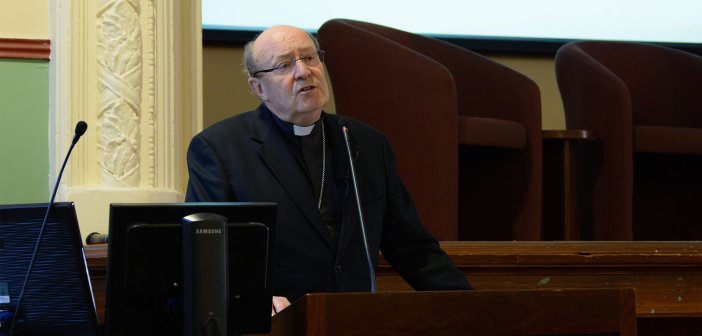Archbishop Julian Porteous explores current thoughts on discrimination and religious freedom which limit the ability of people to engage in political discourse in a respectful manner. Archbishop Julian also discusses anti-discrimination law in Tasmania with regards to marriage.
RIGHT-CLICK TO DOWNLOAD (25:40)
This paper was presented at the 2016 Religious Liberty Conference entitled “Varieties of Diversity”, hosted by the School of Law at the University of Notre Dame Australia.
Transcript
Note: This transcript is taken from the conference paper, which has been updated since the presentation.
Christianity has been integral to the development of Western civilisation. The Western legal tradition which emerged in the twelfth century has been heavily influenced by the Catholic Church.
Some key principles in law flow explicitly from a Christian understanding of life. In our system of law, justice requires the recognition of intention and incorporates the notion of good faith. A key legal principle that our judicial system recognises is the reciprocity of rights. The Magna Carta of 1215 established the practice of trial by jury replacing other practices like trial by ordeal. So many of the laws which we readily accept today like habeas corpus and that an offence must be proved beyond reasonable doubt have been inspired by the Christian understanding of justice. The revelation of Sacred Scripture that God is a just judge is an important and indeed foundational understanding when one considers the capriciousness of the panoply of god in the ancient civilisations like Athens and Rome.
One particular way in which Christianity has shaped Western government is the separation of spiritual authority from civil authority. As the Enlightenment philosopher Jean Jacques Rousseau noted, prior to the arrival of Christ, spiritual and political authority was vested in one person, the ruler. Ancient rulers understood well the human need for worship and in order to ensure absolute authority over society they needed to control both the political and spiritual order. Thus the Roman Empire required worship of the Emperor from its citizens.
State power limited by allegiance to the transcendent
The claim to absolute authority by political rulers was rejected by Christ. Human authority was revised as limited and subordinated to that of the spiritual order. Yet according to Jesus the spiritual order did not claim legitimacy to rule the political order, at least not directly. The State had to recognise a transcendent competitor in its quest for authority over its citizens. Christians refused to follow the instructions or laws to the extent that they conflicted with their religious faith. As the great English lawyer at the moment of his execution under Henry VIII said, “I am the King’s good servant, but God’s first”. One’s highest allegiance was to God, a person could not perform any action or follow any command that was in conflict with God’s law or the teaching of the Church. St Thomas More, in good conscience could not accede to the will of Henry VIII when this conflicted with the law of God.
Christ liberated the people from enslavement to the absolute authority of earthly rulers. These rulers could no longer go unchallenged and do whatever they wanted. Those who became Christians now gave their first allegiance to God and His transcendent law, to which the legislation and the authority of the government was subject.
In other words, Christianity provided a fundamental check on unlimited State power. In this way the Church has always, by its nature, resisted totalitarian rulers. And conversely why those seeking absolute control of their society, such as Hitler and Stalin, have often first gone after the Church or sought to set up their State Churches or indeed create public events mimicking something of Christian liturgical worship.
The Australian Constitution
When Thomas Jefferson crafted the Declaration of Independence on July 4, 1776, he pointed to “certain unalienable rights” with which we were endowed by our “Creator”. These rights are permanent because they have been given by the Creator and merely allowed by the State. The American founding is premised on the idea of individual rights.
The founders were concerned to ensure that government was limited and functioned to serve the people and not the other way around. The protection of individual liberty was of fundamental importance. The War of Independence was fought to oppose overbearing government.
The framers of Australia’s Constitution, working in the 1890s, debated the adoption of a Bill of Rights along the lines of that in the United States. The proposal was not pursued and our Constitution contains few protections for what we now call human rights. Yet they too shared the concern of the America founders.
Thus, Section 116 of the Constitution of Australia precludes the Commonwealth of Australia from making laws for establishing any religion, imposing any religious observance, or prohibiting the free exercise of any religion. It specifically sought to limit the scope of the federal government’s powers. However, are we now witnessing a move to deny the independence of religious bodies? Is there a back door denial of religious freedom?
The question of the freedom of religion in Australian society has become a serious issue in recent times. Several political parties are now calling on the government to remove legislative protections related to religious freedom. They want to subject religion to increasing State oversight and control. We might refer to this as the new totalitarianism.
In the recent election campaign the Tasmanian Greens Senator Nick McKim announced that he wanted to change the Tasmanian Anti-Discrimination Act so that churches would lose their exemption from key parts of the law. His view was that “the fundamental principle here is that Australians should be treated the same, whether or not they’re of one particular religion or another or whether in fact they’re not religious at all”.
Religious freedom particularly for Christians is under threat in many Western nations at the present time. The rise of an aggressive secular humanism, which ultimately is a form of nihilism, seeks to cobble the freedom of Christians, preventing them from playing an active and contributing role in society. This ascendant ideology seeks to impose itself in an absolute way. It speaks of tolerance and diversity yet it seeks to suppress Christianity or indeed any belief system that offers an alternative view to their own. They will only allow what is acceptable to them, only that which fits within their narrow view of the human person. They impose their nihilistic faith on the whole of society while seeking to deny Christians of the basic the freedom to express and live according to their faith. They want to replace the guiding role Christianity has played in western societies with their own secular faith.
Religious communities need to be able to teach what they believe and conduct their activities according to their beliefs. Christianity, in particular, has proved a major contributor to the stability and flourishing of our society.
Why Does Religious Freedom Matter?
The founders of the American Constitution were charting new waters and identified that the American experiment in popular government would only work if it was grounded in a religiously inspired morality. Thus, Samuel Adams in 1778 said, “Religion and good morals are the only solid foundation of public liberty and happiness”.
Despite predictions about the growing irrelevance of Christianity in contemporary society, there are clear signs that Christianity is far from a spent force. The spiritual will always be a key influence in human life. The existence of a transcendent being, the mystery of human existence, determining good and bad, finding final purpose to life, will continue to be the source of religious conviction. The search for the spiritual has always resurfaced after periods of intense persecution as the sorry story of Communism has witnessed. The human spirit seeks meaning and purpose in a relationship with the divine.
Religious freedom, properly understood, involves the quest for the truth, and requires the governments do not hinder individuals in the pursuit of the truth. By respecting this freedom the civil authority acknowledges that such ultimate issues are outside its jurisdiction, and that conscience is answerable to a higher authority than the law of the land. Individuals and institutions should be free to pursue the truth and when they find it worship according to its demands.
Religious freedom is the bedrock for all human freedom. It provides a fundamental check on the power of the State. It is the temptation of government, particularly when it denies religious freedom, to become totalitarian. The threat we now face is that a bold and aggressive secularism (itself a pseudo religion) will attempt to impose itself in a totalitarian way. This totalitarianism preaches tolerance and diversity, denying the existence of an objective truth, and suppressing any claims to truth, yet it in a self-contradictory way it fundamentally claims that its understanding is true.
The freedom of religion, however, is not a freedom to believe whatever you want, whatever makes you feel good, rather it is fundamentally about the freedom to pursue the truth and knowing the truth to act in accordance with the truth.
Authentic freedom or liberty can only exist in relation to the truth. It is only through recognising the transcendent truth and be guided by the truth that authentic freedom can be realised.
We must distinguish, of course, between the capacity for choice and authentic freedom. Simply having the capacity for choice, and freedom to choose how I live my life is not authentic freedom. It is what I choose that makes me free or enslaved. We can sometimes confuse simply being free to make decisions without interference from government as being ‘free’, yet we can use our freedom in such a way as to become enslaved in sin and therefore radically unfree. It is only in choosing to pursue and live in accordance with the truth that we achieve authentic freedom.
The inevitability of offence
Justice is fundamental for the society to flourish. This means that individuals must be protected and safe from arbitrary inference by the government. Justice is best achieved by the institution of the rule of law and civil liberties.
A person should be protected against forms of persecution and from unjust discrimination. Thus our Australian society has enacted Anti-Discrimination legislation. Such laws have been enacted both at the Federal level and the State level. These laws seek to protect people from being treated unjustly due to personal characteristics like race, sex, age and so on.
However, these acts of parliament have been significantly undermined by the use of the concept of ‘offense’. This is a vague notion which refers to a feeling, a subjective emotional state where one is ‘annoyed or upset’ by something that has been said or done. While motivated, no doubt, by good intentions to ensure fair treatment of all, it has set an unreasonable standard by which to limit behaviour and speech. Offense is ultimately a subjective emotion, what is taken to be offensive by one person viewed as harmless by another. It depends largely on the state of emotions of the person. A sensitive person is more likely to claim offence that a person who is more personally secure.
Should the desire that no one feels offended become the criterion for the exercise of free speech? Salman Rushdie has commented:
The idea that any kind of free society can be constructed in which people will never be offended or insulted is absurd. So too is the notion that people should have the right to call on the law to defend them against being offended or insulted. A fundamental decision needs to be made: do we want to live in a free society or not? Democracy is not a tea party where people sit around making polite conversation. In democracies people get extremely upset with each other. They argue vehemently against each other’s positions.
With the rise of a secular ideology there will be the need to courageously speak the inconvenient truth on certain moral issues. It will mean speaking on matters like the nature of marriage, or the protection of human life. A person of faith should be able to publically give expression to what he or she believes, in a respectful way, without being shouted down or labelled a bigot. Yes, it is true that some will be offended when what is said is not acceptable to them. The truth is not always convenient or readily acceptable. It has the capacity of being seen by some as offensive, though this is not its intent. Offence in itself cannot be considered as a reasonable basis for denying freedom of speech.
We must have the freedom to say things, in a respectful way, that others may not accept. Our democratic system needs robust debate. The voice of the person speaking from religious conviction is essential for the health of our society.
However, it is important to note that this is not a justification for anyone to say anything. The line is drawn where speech turns to being libellous, or the promotion of hatred and violence towards others. Freedom of speech, properly understood, is about the sincere desire to speak the truth and not the deliberate intention to deceive or to damage the reputation of the other, or promote violence or hatred.
Anti-Discrimination law
I would like to make some brief comments about the current Anti-Discrimination law in Tasmania. The relevant part of the Act, Section 17 (1), says that a “person must not engage in any conduct which offends, humiliates, intimidates, insults or ridicules another person” on the basis of various attributes like race, sex, etc.
Section 17 (1) offers the widest and most general options for a person to interpret discrimination against them for all States in Australia. For example the NSW Act, in relation to homosexual persons, speaks of inciting hatred towards or serious contempt. The Queensland legislation uses the same terms in relation to race, religion, sexuality or gender identity.
What is particularly notable about the Tasmanian law is that it only requires a person to feel offended. This, as we have seen, is a highly subjective matter. What offends one person can be found to be harmless by another. The law as it stands does not need the alleged offence to the directed towards a particular person. In my case the complainant heard that I had distributed a booklet defending the traditional understanding of marriage and obtained a copy from the internet and then complained about being offended. The booklet was not even distributed directly to the complainant.
The only way to ensure that freedom of speech, respectful speech, is to significantly amend Section 17(1). Until this is done the threat remains that anyone who simply seeks to promote a traditional understanding of marriage is open to prosecution through the act.
On 17 August the Tasmanian government announced that it is proposing a number of changes to the Anti-Discrimination Act. It is proposing to add “religious purposes” in section 55 public purpose defence of the Act. It is not clear exactly how the government will do this in the actual wording of the amendment, but as the section 55 defence currently applies to both section 17 and section 19, I want to make it clear that we do not support any exemption for ‘religious purposes’ from ‘hate speech’. It will be necessary for the government to draft the amendment in such a way to ensure this does not happen. The promotion of hate speech is never acceptable.
The government is also strengthening section 64 of the Act so that unreasonable complaints can be quickly assessed and dismissed.
These are improvements to the law. However, section 17(1) remains the same. This still allows for the very subjective notion of “offend” to be retained. I believe it is necessary to change the wording of section 17(1).
What is important, as many point out, is that the Anti-discrimination Act clearly and strongly prohibits speech or actions which promote hatred towards any individual or group within society in Section 19 of the Act. Amending section 17 to remove subjective terminology such as ‘offends’ will in no way lessen the protections against hate speech. There is clearly a misinformation campaign that is confusing the issue claiming that any attempt to amend section 17 will somehow encourage hate speech. Such an argument is false and mischievous.
I believe section 17(1) in its current form does not pass the “pub test”. As I visit communities through Tasmania the people I speak to cannot understand how the teaching I distributed could in any sense be deemed ‘offensive’. And they are fearful that if I could be cited for simply expressing a well held position on marriage, so could they. The changes outlined by the government while offering those acting for religious purposes great protection will do little for average person simply wanting to engage in respectful discussion with others. Section 17 in its current form clearly places an unreasonable imposition on our ability to engage in robust but respectful public debate.
With the likely prospect of a national plebiscite on marriage in the next 6-8 months it is vitally important that all in Tasmania are able to engage in robust and respectful, debate and discussion without the threat of being reported to the Anti-discrimination Commission. Unless section 17(1) is amended Tasmanians will not feel able to express their deeply held beliefs on the nature of marriage in good faith in a respectful way, as I did, for fear of being sanctioned by the Anti-discrimination Commissioner. I have received numerous letters and emails from concerned individuals who fear that if they do as I did and speak to others about the importance and significance of marriage for our society they will end up before the Commissioner, facing significant legal costs and possibly penalties.
We must end this fear so that all can engage in respectful debate on the most important issues facing our society.
Preserving religious freedom
In an address to the American Bishops during an ad limina in 2012 Pope Benedict commented,
In the light of these considerations, it is imperative that the entire Catholic community in the United States come to realize the grave threats to the Church’s public moral witness presented by a radical secularism which finds increasing expression in the political and cultural spheres. The seriousness of these threats needs to be clearly appreciated at every level of ecclesial life. Of particular concern are certain attempts being made to limit that most cherished of American freedoms, the freedom of religion. Many of you have pointed out that concerted efforts have been made to deny the right of conscientious objection on the part of Catholic individuals and institutions with regard to cooperation in intrinsically evil practices. Others have spoken to me of a worrying tendency to reduce religious freedom to mere freedom of worship without guarantees of respect for freedom of conscience.
Respecting and preserving freedom of religion will be one of the defining issues of the time ahead in Australia. As those who are pushing for a social reconstruction devoid of Christian morality demand total adherence to the new order, Christians will find themselves denied freedom of speech and will be persecuted in various ways. We will have a pay a price for holding to the truth about the human person and about the character of human society.
Freedom of religion and freedom of speech are the new challenge that Western parliamentary democracy in Australia is going to have to face. For the sake of our nation I hope and pray that freedom will be defended.






2 Comments
Thank you Archbishop Julian for this excellent address. Very informative and inspiring. Your thoughtful and balanced insights regarding faith, family and religious freedom are needed to help inform the national conversation.